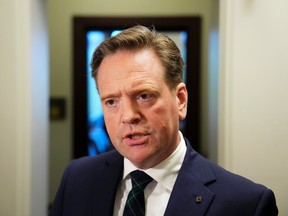The university leaders were testifying at the Commons Justice committee on combatting antisemitism

Article content
OTTAWA – The head of Universities Canada said Monday he supports shutting down anti-Israel encampments on campuses across the country.
Universities Canada president and CEO Gabriel Miller also said that enforcing university speech codes against antisemitic hate has been a challenge, the same day leaders of four major universities said that antisemitism on their campuses is a serious problem.
Advertisement 2
Article content
Article content
The university leaders were testifying at the Commons justice committee on combatting antisemitism. Afterwards reporters asked Miller, whose industry group represents all the major universities across Canada, about the encampments.
“The goal… is for these encampments to come to an end in a peaceful way, in a way that respects and upholds legitimate freedom of expression and academic freedom. But yes, we need our universities to be able to return to a place where everyone is able to learn and feel secure and safe on campus,” he said.
Recommended from Editorial
During the committee meeting, the heads of McGill University, Concordia University, University of British Columbia and University of Toronto admitted that antisemitism on their campuses was a “significant problem.”
McGill University president and vice-chancellor Deep Saini said it is “simply unacceptable” that Jewish students have felt intimidated on their campus, a position echoed by the three other university presidents at the committee.
Article content
Advertisement 3
Article content
Jewish groups, anti-hate activists and police forces across the country have reported a notable increase in antisemitic incidents since the brutal attacks by terrorist group Hamas against Israel on Oct. 7.
Many Jewish students and Jewish groups on Canadian university campuses have also reported being attacked, verbally and physically.
Despite those incidents, Miller says that enforcement of member institutions’ rules against hate speech continues to be a challenge. He was not able to say if any students or university faculty had been disciplined for antisemitic events to date.
He told reporters after his testimony that the “biggest gap” is understanding and awareness for all individuals on campus about what is “legitimate criticism” and what is hate speech.
“There’s no question we have to do much, much better on this. And I think there may be instances where the sensitivity to the importance of antisemitism isn’t as great as it needs to be,” he said.
Two weeks ago, students from multiple schools said during a press conference in Ottawa that they are being harassed and assaulted on their campuses. On Monday, MPs and witnesses such as lawyer Mark Sandler detailed other incidents such as antisemitic chants, slogans and incidents happening at anti-Israel encampments on university campuses.
Advertisement 4
Article content
MPs from all parties grilled the heads of the four universities about what they called a disconnect between their words denouncing antisemitism on their campuses and their actions.
“There seems to be a disconnect between what (students) are saying and then what you’re saying,” Liberal MP Julie Dabrusin told the university presidents.
“University has absolutely become a place for hate and intolerance,” Conservative MP Melissa Lantsman said.
National Post
cnardi@postmedia.com
Get more deep-dive National Post political coverage and analysis in your inbox with the Political Hack newsletter, where Ottawa bureau chief Stuart Thomson and political analyst Tasha Kheiriddin get at what’s really going on behind the scenes on Parliament Hill every Wednesday and Friday, exclusively for subscribers. Sign up here.
Article content




